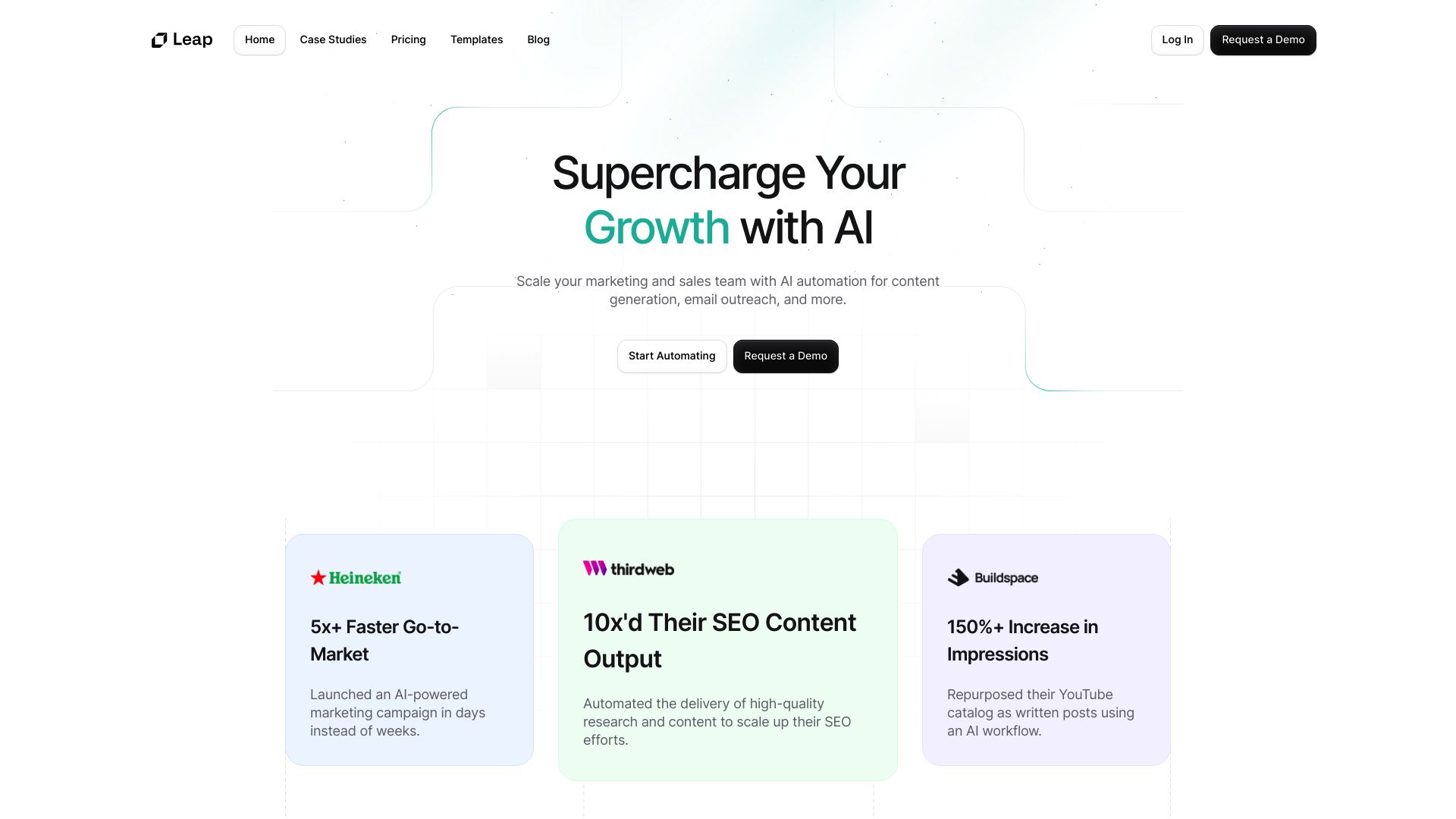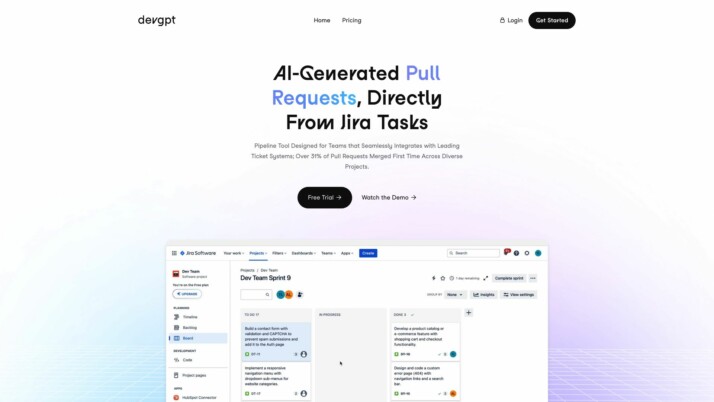Leap AI vs. DevGPT: Comparing AI Development Platforms
AI platforms revolutionize software development and workflow automation, empowering users with varying technical expertise. This comparison examines Leap AI vs. DevGPT, and SmythOS, three distinct solutions addressing different aspects of AI integration. Leap AI offers a no-code approach to building AI workflows, while DevGPT focuses on automating coding tasks for developers. SmythOS emerges as a comprehensive platform, combining the strengths of both while addressing their limitations. We’ll explore each platform’s key features, use cases, and target audiences, helping you determine which solution best fits your AI development needs.
Leap AI Overview
Leap AI empowers users to create sophisticated AI workflows without coding expertise. The platform’s drag-and-drop interface enables rapid development of AI-powered applications, from blog post generators to music creators. Leap AI integrates with popular AI models like OpenAI GPT and Stable Diffusion XL, offering versatility across text, image, and audio generation tasks.


Leap AI’s comprehensive SDK support, including RESTful API, TypeScript, and Python, facilitates seamless integration into various applications. The platform boasts an extensive template library, accelerating the creation of AI applications for diverse use cases. Leap AI’s integration capabilities extend to popular tools like Slack, HubSpot, and Zapier, enhancing its utility across different business ecosystems.
Leap AI’s comprehensive SDK support, including RESTful API, TypeScript, and Python, facilitates seamless integration into various applications.
The user-friendly interface allows for visual workflow design and execution directly from the dashboard. Leap AI also offers AI model training features, enabling users to fine-tune custom models with their datasets for enhanced specificity and accuracy.
While Leap AI excels in providing a low-code/no-code environment for AI development, it lacks some advanced features found in other platforms. The absence of hosted agents, autonomous agent capabilities, and features like debug mode and constrained alignment may limit its appeal to users requiring more complex AI implementations.
Leap AI’s vision centers on democratizing AI technology, making sophisticated AI workflows accessible to a broader audience. By eliminating coding barriers, the platform aims to empower businesses and individuals to leverage AI for task automation, efficiency improvement, and innovation across various domains.
DevGPT Overview
DevGPT transforms natural language prompts into executable code, streamlining software development workflows. This open-source AI assistant integrates with GitHub and Jira, automating pull request generation from tasks and tickets. DevGPT leverages GPT-4 and Codex models to power its code generation capabilities, focusing on serving individual developers and small teams.
DevGPT’s personalized training feature adapts to a developer’s unique coding style by learning from their existing codebase. Users can further refine generated code through editable outputs and feedback comments. Early adopters report significant time savings, with over 10 hours reclaimed per week on average.


DevGPT’s personalized training feature adapts to a developer’s unique coding style by learning from their existing codebase. Users can further refine generated code through editable outputs and feedback comments.
While DevGPT excels at automating repetitive coding tasks, it lacks some advanced features found in comprehensive AI platforms. The tool doesn’t offer hosted agent environments, autonomous agent capabilities, or multi-agent collaboration. DevGPT also falls short in areas like explainability, debugging tools, and constrained alignment mechanisms.
Despite these limitations, DevGPT’s vision to become an indispensable AI-powered coding companion drives its development. The platform aims to expand its accessibility from individuals to companies of all sizes, fostering an engaged community of users and contributors to shape its future. By focusing on enhancing developers’ workflows through AI, DevGPT allows teams to concentrate their efforts on solving complex coding challenges.
Feature Comparison
Leap AI and DevGPT offer distinct approaches to AI-powered development, each with unique strengths and limitations. Leap AI provides a versatile no-code platform for creating AI workflows across various domains. Its drag-and-drop interface and extensive template library empower users to build sophisticated AI applications without coding expertise. Leap AI integrates popular AI models and supports multiple data types, enabling diverse use cases from text generation to image creation.
DevGPT, in contrast, focuses specifically on software development workflows. It excels at transforming natural language prompts into executable code, leveraging models like GPT-4 and Codex. DevGPT’s personalized training feature allows it to adapt to individual coding styles, potentially boosting developer productivity. However, DevGPT lacks some of the broader AI application capabilities found in Leap AI.
Both platforms fall short in certain areas compared to more comprehensive solutions like SmythOS. Neither Leap AI nor DevGPT offer hosted agent environments or autonomous agent capabilities. They also lack advanced features such as debug modes, explainability tools, and multi-agent collaboration support. SmythOS provides these missing elements, along with robust security features like constrained alignment and comprehensive deployment options, making it a more versatile choice for complex AI implementations across various industries.
Feature Comparison Table
| Leap AI | DevGPT | SmythOS | |
|---|---|---|---|
| CORE FEATURES | |||
| Hosted Agents (Dev, Production) | ❌ | ❌ | ✅ |
| Environments (Dev, Production) | ✅ | ❌ | ✅ |
| Visual Builder | ✅ | ❌ | ✅ |
| No-Code Options | ✅ | ❌ | ✅ |
| Autonomous Agents | ❌ | ❌ | ✅ |
| Explainability & Transparency | ❌ | ❌ | ✅ |
| Debug Tools | ❌ | ✅ | ✅ |
| Multimodal | ✅ | ❌ | ✅ |
| Multi-Agent Collaboration | ❌ | ❌ | ✅ |
| Audit Logs for Analytics | ✅ | ❌ | ✅ |
| Bulk Work | ✅ | ❌ | ✅ |
| Agent Work Scheduler | ✅ | ❌ | ✅ |
| Logs & Monitoring | ✅ | ❌ | ✅ |
| SECURITY | |||
| Constrained Alignment | ❌ | ❌ | ✅ |
| Data Encryption | ✅ | ❌ | ✅ |
| OAuth | ✅ | ❌ | ✅ |
| IP Control | ✅ | ❌ | ✅ |
| COMPONENTS | |||
| Foundation AIs | ✅ | ❌ | ✅ |
| Huggingface AIs | ✅ | ❌ | ✅ |
| Zapier APIs | ✅ | ❌ | ✅ |
| All other APIs, RPA | ✅ | ❌ | ✅ |
| Classifiers | ✅ | ❌ | ✅ |
| Logic | ✅ | ❌ | ✅ |
| Data Lakes | ❌ | ❌ | ✅ |
| DEPLOYMENT OPTIONS (EMBODIMENTS) | |||
| Deploy as API | ✅ | ❌ | ✅ |
| Deploy as Webhook | ✅ | ❌ | ✅ |
| Staging Domains | ✅ | ❌ | ✅ |
| Production Domains | ✅ | ❌ | ✅ |
| API Authentication (OAuth + Key) | ✅ | ❌ | ✅ |
| Deploy as Site Chat | ✅ | ❌ | ✅ |
| Deploy as Scheduled Agent | ✅ | ❌ | ✅ |
| Deploy as GPT | ✅ | ❌ | ✅ |
| Scalability | ✅ | ❌ | ✅ |
| DATA LAKE SUPPORT | |||
| Hosted Vector Database | ❌ | ❌ | ✅ |
| Sitemap Crawler | ✅ | ❌ | ✅ |
| YouTube Transcript Crawler | ✅ | ❌ | ✅ |
| URL Crawler | ✅ | ❌ | ✅ |
| PDF Support | ✅ | ❌ | ✅ |
| Word File Support | ✅ | ❌ | ✅ |
Best Alternative to Leap AI and DevGPT
SmythOS stands out as the superior alternative to Leap AI and DevGPT, offering a comprehensive platform for AI agent development and deployment. Our solution combines powerful features with user-friendly design, making advanced AI capabilities accessible to users of all skill levels.
Unlike Leap AI and DevGPT, SmythOS provides hosted agent environments for both development and production, enabling seamless transitions from testing to live deployment. We offer autonomous agent capabilities, allowing AI to operate independently and solve complex problems without constant human intervention. This feature significantly enhances productivity and enables 24/7 operation.
SmythOS provides hosted agent environments for both development and production, enabling seamless transitions from testing to live deployment.
Our platform excels in multi-agent collaboration, a feature absent in both Leap AI and DevGPT. This allows teams of AI agents to work together on complex tasks, mimicking human team dynamics and greatly expanding the scope of achievable projects. Additionally, SmythOS includes robust debug tools and explainability features, ensuring transparency in AI operations and facilitating quick issue resolution.
SmythOS sets itself apart with its extensive deployment options. Users can deploy their AI agents as APIs, webhooks, scheduled tasks, or even integrate them with popular platforms like GPT. This flexibility, combined with our scalable infrastructure, allows businesses to grow their AI solutions without constraints. Whether you’re a small startup or a large enterprise, SmythOS adapts to your needs, providing a future-proof solution for AI development and deployment.
Conclusion
Leap AI and DevGPT offer unique approaches to AI-powered development, each with distinct strengths. Leap AI excels in providing a versatile no-code platform for creating AI workflows across various domains, while DevGPT focuses on streamlining software development tasks through natural language processing.
However, SmythOS emerges as the superior choice, offering a comprehensive suite of features that address the limitations of both Leap AI and DevGPT. SmythOS provides hosted agent environments, autonomous agent capabilities, and advanced features like debug modes and explainability tools. These capabilities, combined with robust security measures and extensive deployment options, make SmythOS the ideal platform for complex AI implementations across diverse industries.
SmythOS’s drag-and-drop interface, coupled with its extensive integration ecosystem, empowers users to create sophisticated AI workflows without extensive coding knowledge. This democratization of AI development opens up new possibilities for businesses of all sizes to leverage cutting-edge technology.
For those looking to harness the full potential of AI in their workflows, SmythOS offers a range of flexible pricing options to suit various needs. We invite you to explore our diverse suite of AI-powered agent templates and experience firsthand how SmythOS can revolutionize your approach to AI development and deployment. Create your free SmythOS account today and join the AI-powered future of work.
Last updated:
Disclaimer: The information presented in this article is for general informational purposes only and is provided as is. While we strive to keep the content up-to-date and accurate, we make no representations or warranties of any kind, express or implied, about the completeness, accuracy, reliability, suitability, or availability of the information contained in this article.
Any reliance you place on such information is strictly at your own risk. We reserve the right to make additions, deletions, or modifications to the contents of this article at any time without prior notice.
In no event will we be liable for any loss or damage including without limitation, indirect or consequential loss or damage, or any loss or damage whatsoever arising from loss of data, profits, or any other loss not specified herein arising out of, or in connection with, the use of this article.
Despite our best efforts, this article may contain oversights, errors, or omissions. If you notice any inaccuracies or have concerns about the content, please report them through our content feedback form. Your input helps us maintain the quality and reliability of our information.
